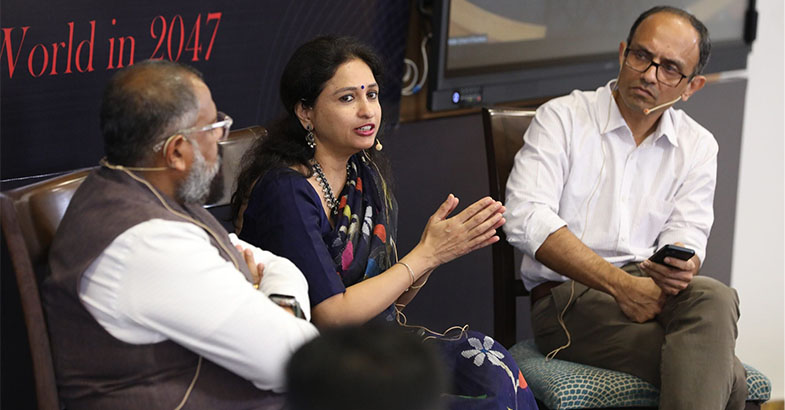
Mohali: Sarang Deo, Professor, Operations Management, Deputy Dean, Faculty and Research, Executive Director, ISB’s Max Institute of Healthcare Management, chaired and moderated a session titled ‘In Healing Healthcare, Private Matters: How to Diagnose the Future of Healthcare in India’ at the ISB Insights Forum. The panel reviewed the evidence on the impact of existing private sector engagement models and brainstormed on promising novel approaches that can serve the dual objectives of creating a healthy society as well as a prosperous and socially responsible private sector.
Session panellists included Sudha Chandrashekar Senior Consultant, The World Bank, Shibu Vijayan, Medical Director – Global Health, Qure.ai and Praveen Pardeshi, Member-Administration, Capacity Building Commission. The panel underlined that in recent years, promising examples of public-private partnerships have emerged that demonstrate that challenges in this domain can be overcome to achieve a win-win. These include privately managed but government-contracted ambulance services in almost all Indian states, patient-provider support agencies for finding and managing TB cases across more than 300 districts, and the involvement of thousands of private hospitals and clinics to deliver COVID vaccines.
Responding to the question by Prof Deo on how the private sector can play a role for better healthcare delivery In India, Mr Pardeshi, explained: “50% of women seek cancer treatment in late stages, leading to higher mortality. In the USA, early detection through continuous monitoring prevents such cases. We are now trying to do this in non-communicable disease programme by focusing on interventions beyond medicine. Since, early detection enables swift, non-invasive treatments, enhancing private sector capabilities can support public health infrastructure for comprehensive non-communicable disease detection in the primary health system.”
Commenting upon the need to strengthen health policy decisions, Ms Chandrashekar, Senior Consultant, The World Bank said that “strengthening the policy research agenda is crucial because we have to understand the challenges, enablers, and influences of policy implementation including that of National Health Policy. Various ministries, including those outside the health purview, consistently contribute with targets and announcements, however evaluating the progress and its alignment with desired health goals is essential for effective policymaking.”
Mr Vijayan suggested that the focus should be on leveraging multiple data sources for a broader pattern analysis to better healthcare delivery.
“Using multiple data points like X-rays, ICU admissions, and paracetamol consumption can provide valuable insights. It can offer early warning signs and thus offer a proactive approach to disease preparedness,” he said.
Prof Deo highlighted that as the country undergoes an epidemiological transition, from acute conditions and communicable diseases to noncommunicable and chronic diseases, country need novel approaches to private sector engagement in the domains of population health management, care continuity and value-based approaches to financing and delivery of health. Further, these engagement models need to leverage new technological breakthroughs in artificial intelligence and data science to improve their effectiveness and reach.

